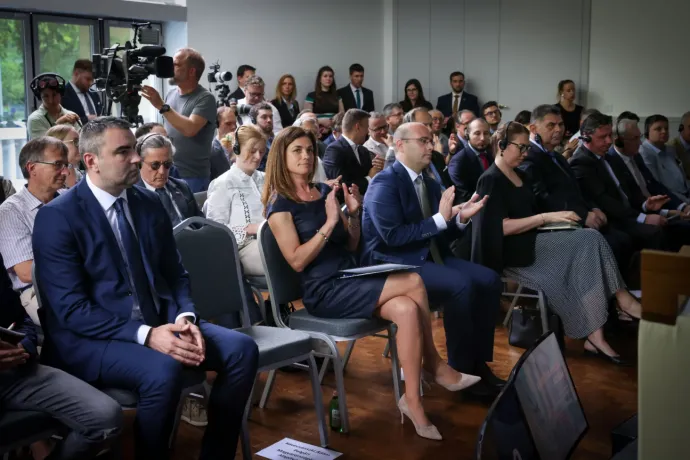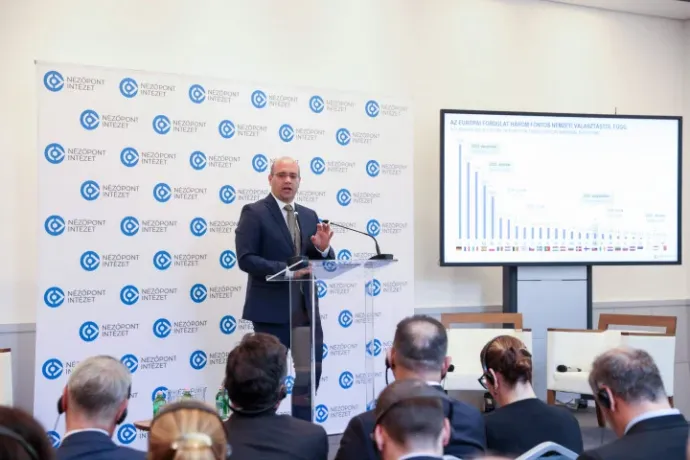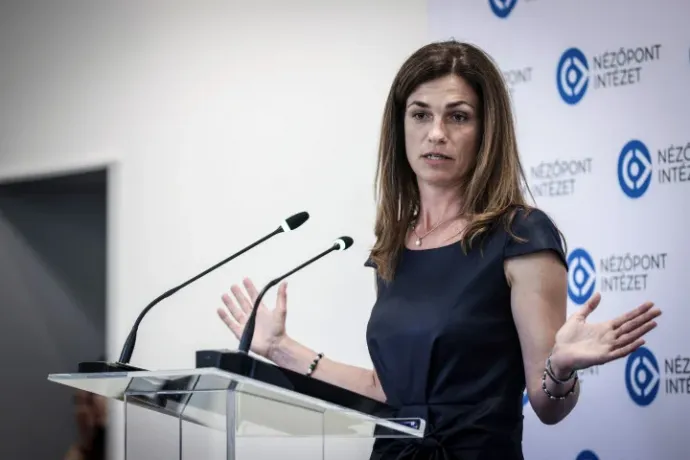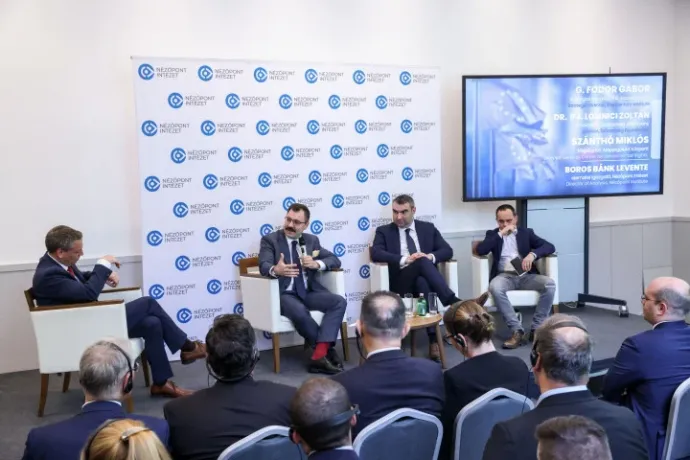Three upcoming national elections could bring about Orbán's veto coalition and a turnaround in Europe, think tank expects

In its current form, the European Union is not a good thing, while Hungary is under attack for its commitment to national values, but the right still does have reason for omptimism: Fidesz could win the 2024 EP elections in Hungary again, and after three national elections across the continent, Viktor Orbán's "sovereignist veto coalition" could be formed in the European Council. At the Nézőpont Institute's event on Thursday, the audience, mostly consisting of ambassadors and invited guests, listened to Judit Varga talk about how the European Union has repeatedly fooled Hungary, while the Union is struggling with a crisis of leadership and has now become a mere supporting actor on the stage of history. We also found out how many children three Fidesz analysts have and what Gábor G. Fodor thinks is the secret to Fidesz's success.
Nézőpont Institute, the government-affiliated think tank, isn't expecting any major changes at the 2024 EP elections. Speaking at an event organised by the institute on Thursday at the headquarters of Polgári Magyarországért Alapítvány (Foundation for a Civic Hungary, the party foundation of Fidesz) on Stefánia út, Ágoston Sámuel Mráz said that according to their latest analysis, Fidesz could win as big a victory on 9 June 2024 as it did at the last EP elections or five years before.
According to a survey conducted by Nézőpont in mid-May, 51% of Hungarian voters would vote for Fidesz. This would mean the governing party would win 13 seats, the same as in 2019. DK would win 4 seats, Momentum 2 and Jobbik 1 in an EP election this Sunday.
Mráz said it was a historical justice that the Hungarian Social Party, MSZP's popularity had plummeted and, at 2 percent, the poll showed it would not win a single seat. The Socialists could be replaced by far-right Mi Hazánk, which could even beat Jobbik by one percentage point.
Závecz's poll from a few weeks ago had similar results: only those showed that László Torockai's party (Mi Hazánk) would win an EP mandate at the expense of Fidesz instead of MSZP.
According to a survey by Nézőpont Institute, the European results of the EP elections could be similar to those from four years ago. Polls suggest a weakening of the Greens and the liberal Renew Europe and a strengthening of the European Conservatives next June.
However, they believe that this will not be enough to rebalance the EP's power, and "there is every chance that the federalist 'United States of Europe' coalition will survive".
The event was titled: "Will there be a turnaround in the European Union?" and Ágoston Mráz hopes that there will. He believes this depends on three important national elections:
- in Slovakia in September,
- in Poland in October,
- and in Spain in December.
If the sovereignist leadership wins in these countries – which Nézőpont believes is a distinct possibility – a so-called veto alliance could be formed against the federalist majority in the European Council, the European Union's most important decision-making body.

While Hungary's veto is enough in cases where a unanimous vote is required, Mráz says Orbán will need more allies to nominate the new president of the European Commission. A qualified majority requires the votes of at least 72 percent of the members of the European Council, representing at least 65 percent of the EU's population.
In a favourable scenario, Nézőpont Institute expects Orbán to be able to block a federalist president of the European Commission with Italy, Spain, Poland and the Czech Republic.
Most EU legislation is adopted in the Council by qualified majority. If Slovakia were to join the aforementioned veto alliance, Mráz says the situation in the European Council would be less tragic.
"Our message is that the EP elections are very important, but no one should expect a huge change in the European Parliament (...) The future of the European Union will be decided in three elections," Mráz said, summing up the main findings of the research.
Judit Varga: Europe is fumbling on the stage of history as a clumsy supporting actor
Although no major changes can be expected in the composition of the European Parliament after 2024, Judit Varga promised on behalf of the Hungarian government that when it comes to EU politics, they will continue to stand firm and resist any global wave that goes against "the interests of the Hungarian people".
Speaking at the conference, the Justice Minister said that the European headwinds against Hungary could not be greater. At the same time, she sought to reassure everyone that the Hungarian government is not only equipped with a raincoat in this storm, but that it has the necessary experience and legal know-how following the battles of recent years.
Varga said there was a crisis of confidence between the EU institutions and Hungary, which was about how fairly they behave towards each other. When it comes to the EU institutions, she said that she sees that they don't say what they mean, they don't do what they say, and then it's hard to know whether they did what they meant. "So much has been promised and so many of those things have not been delivered," the justice minister said.
“In the spirit of fairness, the Hungarian government always says what it thinks and then does what it said it would do.”
Varga also explained why the European Parliament could soon adopt a resolution saying that the Orbán government is unfit to hold the rotating presidency of the EU Council. She said that Hungary was being attacked because it was no secret that our objective as President of the Council of the EU was to hold the EU institutions accountable on the rule of law. The Hungarian government would examine for example, whether the European Parliament, which is "bathed in corruption scandals", is abiding by the rule of law.

However, the European Parliament has not been dealt a hand on this issue, Varga said, as the European Council, which brings together the leaders of the member states, has decided that Hungary will be the rotating president of the EU Council. At Thursday's cabinet briefing, Minister at the Prime Minister's Office Gergely Gulyás said that, the European Parliament has as much of a say in who should be the EU's rotating president as the parliament of Azerbaijan.
Varga said that the main problem facing the European Union is that "no one dares to or is able to lead Europe today".
Where are the Thatchers and Adenauers? – the minister asked and added that today it is the NGOs, the foundations and think tanks that are dictating how the EU should be run, based on the power interests of their financiers.
The lack of leadership and the mismanagement of crises have led to a situation where the EU is no longer a factor but a pawn in world politics.
“Europe is fumbling on the stage of history as a clumsy supporting actor whose hand needs to be held.”
At the same time, she sees more and more people in Europe beginning to discover that the direction the EU leadership is pushing for is not the right one. The 2024 elections might be a good moment for each nation to come to that conclusion individually, she says. At least that is her hope.
The secret to Fidesz's success unlocked
The Minister of Justice was followed by four pro-government pundits and analysts, who – as the audience found out from the introduction of Levente Boros Bánk, revealing "interesting facts" – don't just talk about the value of the family, but also "work" on it: the three panellists together are fathers of eight children.
Miklós Szánthó modestly pointed out that this was more the mothers' doing, which reminded Nézőpont's Director of Analysis of a good story, which he shared with the ambassadors and guests in the audience. According to this, he recently attended a party with his friend Ágoston Mráz on the occasion of someone having become a father. And imagine, they didn't give the father a present, but sent a bouquet of flowers to the mother instead.

The amiable conversation and Mr. Zoltán Lomnici's birthday greeting turned somber when they turned to the current state of the European Union. Miklós Szánthó, Director General of the Centre for Fundamental Rights, began by saying that
today, the European Parliament is like an asylum, where the patients have taken over.
Szánthó said that the "the current knucklehead" is German MEP Daniel Freund who, according to Szánthó, "has escaped from the asylum and is pretending to be a nurse, deceiving the outside world".
According to the director-general of the Centre for Fundamental Rights, which is stuffed with billions of public funding, there is a sovereignist-globalist conflict in the European Parliament today, and to his great regret, the globalist camp is in the majority. He doesn't expect a huge change at next year's EP elections, but he would be happy to see more nurses and fewer fools in the EP than now.
Szánthó believes that Hungary has been under a constant barrage of bullets for 13 years now – roughly since the amendment of the media law – because mainstream liberal forces fear that the knowledge of the Hungarian right will spread to Western Europe and lead the civic forces, which are currently in the minority, to success.
The secret of Fidesz's success, which has been described as unprecedented in Europe, was explained by Gábor Fodor, strategic director of the XXI Century Institute.
"Fidesz is a rebellion on behalf of the electorate against the institutions."
According to him, Viktor Orbán's party has recognised that voters are more important than institutions. And researchers of the Hungarian prime minister's success should not be tracking what Viktor Orbán says, but what political experience he has built up over the past three decades. Fodor says that in politics, one gets stronger every day, and experience is like muscle.
The head of strategy at the XXI Century Institute pointed out that next year's EP elections will be about domestic issues, and the most important question is how Fidesz will define the stakes of the election and what issues it will focus on.
He said that even if it would be possible to make a good Marvel film about the fight between sovereignists and globalists with Viktor Orbán on the poster, this is not the issue that should be the focus of the campaign.
For G. Fodor, it is still unclear whether the veto alliance presented in the analysis of Nézőpont can be a political tool that can become a creative force. Overall, however, he is optimistic, as he considers Fides to be the most innovative party in Europe, and he believes that they are particularly good at finding new political solutions.
For more quick, accurate and impartial news from and about Hungary, subscribe to the Telex English newsletter!